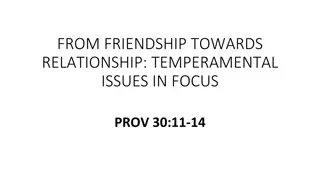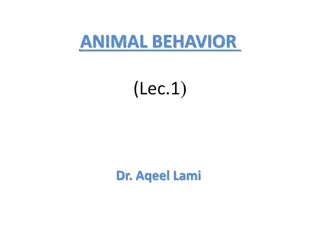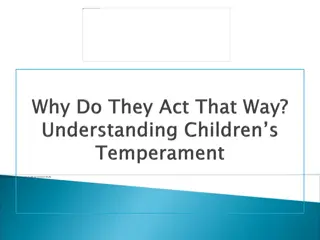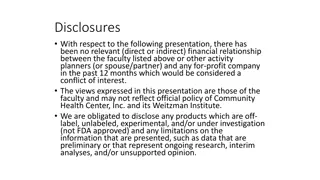Understanding Types of Temperament and Their Impact on Behavior
The concept of temperament has intrigued people for ages, influencing individual behavior in various aspects of life. This article explores the characteristics of different temperaments such as Choleric, Phlegmatic, Sanguine, and Melancholic, shedding light on their distinct behavioral traits and reactions. Understanding temperament can provide a deeper insight into how individuals interact, make decisions, and navigate career choices.
Download Presentation

Please find below an Image/Link to download the presentation.
The content on the website is provided AS IS for your information and personal use only. It may not be sold, licensed, or shared on other websites without obtaining consent from the author. Download presentation by click this link. If you encounter any issues during the download, it is possible that the publisher has removed the file from their server.
E N D
Presentation Transcript
: Types of temperament, their characteristics and impact on individual behavior : : 9 : : . . 23 23 2020 2020
The aim of the work To consider the process of temperament influence on people's lifestyle and career choice. To find out the main features of each of these types of temperament. The main task Study of psychological and pedagogical literature on the problem of temperament and its features. Consider the psychological nature of temperament, approaches to its study and its manifestations in communication. Hypothesis Each type of temperament has its own behavioral reactions.
Introduction The problem of human temperament has occupied the minds of people around the world for many years. Temperament is a natural personality trait of man, and the reason to consider it a personal property is the fact that the temperament depends on the actions that people perform, as well as behavioral motives. The temperament is manifested in all spheres of human life: in the game, educational, labor and creative. The type of temperament depends on the pace of speech, responsiveness to the feelings of others, emotionality, stress tolerance, sociability, perseverance, ability to lead. The first signs of differences in temperament can be seen at a very early age, when young children may behave quite differently. Ancient Greek doctor Hippocrates first introduced the term "temperament" in history. He identified types that do not change even to this day: choleric, phlegmatic, sanguine and melancholic. Originally, according to Hippocrates, temperament meant only the constitution of the body of an individual, but later Roman physician Claudius Galen changed the concept of this term to the features of the soul, which suited these types. In the 19th century, the scientist I.P. Pavlov was associated with the discovery of the following basic properties of the nervous system: strength - weakness, excitability - inertness and balance. A little later, it was discovered such a property of the nervous system as lability, that is, rapid response to stimulus, as well as the opposite property, called stiffness - slow response of the nervous system to stimulus. With full conviction that the type of temperament depends on the individual combination of properties of the nervous system, the situation is still quite confusing, and many things remain unknown to modern science. Four temperaments, from left to right, from top to bottom: sanguine, phlegmatic, choleric, melancholic (engraving by Johann Lafater, XVIII century).
Choleric temperament type Choleric is a strong, excitable, labile and unbalanced nervous system, with excitation dominating over inhibition. excitation over inhibition, so he reacts very quickly, often thoughtlessly, does not have time to restrain themselves, shows impatience, impulsiveness, sharpness of movements, irritability, unrestraint. Choleric is very mobile, does not tolerate long waiting, is subject to sudden changes in mood. It is difficult to predict how he will behave in a new environment, the reaction can be very different. This is a person whose nervous system is determined by the prevalence of The main features of this type: vulnerability restlessness irritability variability impulsivity optimism activity The main problems that this type has: he may be very passionate about a certain idea, and not pay attention to the recommendation to leave it many things are done inattentively and thoughtlessly difficult to compromise, very aggressive and passionate over independence, risk-taking and a tendency to rash action
Phlegmatic temperament type Phlegmatic is a person with a strong, balanced, but inert nervous system, with a weak external expression of mental states. He reacts slowly, unspoken, emotions are slow (difficult to anger, cheer), has high performance, resists well strong and lasting irritants, difficulties, but is not able to respond quickly in unexpected new situations. Not capable of giving up developed skills and stereotypes. Slow enough in movement. The main problems that this type has: The main features of this type: balance reliability peaceableness attention extremely slow, often fails to keep up with the pace of life impatient for the slightest change in life's routine he is very hesitant carefulness his emotional state almost never changes passivity
Sanguine temperament type Sanguine is a cheerful, agile, easygoing and sometimes frivolous person, often in a good mood. Strong, excitable, labile and balanced nervous system. makes him highly resistant to the difficulties of life. The mobility of his nervous system determines the variability of feelings, affections, interests, views, high adaptability to new conditions. This is a sociable person, easily convergent with new people, and therefore he has a wide range of acquaintances, although he is not characterized by constancy in communication and attachment. He has a fast reaction rate; his actions are deliberate; he is cheerful, which The main features of this type: carelessness cheerfulness kindness variability The main problems that this type has: he doesn't like boring, monotonous, uniform activities he's turning his attention too quickly often loses interest in people and activities in some cases lacks a sense of proportion promise more than he can deliver is often perceived by others as thoughtless and stupid gab friendliness responsiveness
Melancholic temperament type Melancholic is a person with a weak nervous system, who has a high sensitivity even to weak stimulus. Melancholics get lost in an unfamiliar environment and are completely unable to stand up for themselves. The slightest trouble can bring them out of balance. They say they don't speak loudly, rarely argue, more often obey the opinion of stronger people. People with this type of temperament quickly get tired, lost if they meet difficulties, quickly give up. The main features of this type: The main problems that this type has: it's easy to change moods nervousness prudence pessimism reticence unsociety softness vindictive, mistrustful and vengeful very low performance inclination to depression, mental illness and suicidal behavior hates rush and active/sportive lifestyle insularity and suspicion, trust issues (very often)
The influence of temperament on career choices Professions for choleric. Choleric people are very successful in those professions where it is important to be able to make contacts and to dispose of themselves. Choleric can easily move from one job to another, quickly adapts to change. Conversely, it is difficult to endure monotonous activities, very quickly tired of it. Professions for phlegmatic. The calm phlegmatic is useful in all areas of activity, where it is necessary to analyze the situation in cold blood and make a decision. Phlegmatic is indispensable in production, administration and wherever stability and peace of mind are required. Professions for sanguine. Stable performance allows sanguine workers to successfully implement in many professions that use both physical and mental work. Communication skills help in service occupations. Sanguineers can easily adapt to any work schedule. Professions for melancholic. Melancholics are successful in activities that require attention to detail and observation, but do not involve much communication. The subject of work of a melancholic can be technique, information, art. A melancholic can also take place as a writer, artist or film critic.
The influence of temperament on interpersonal relations Choleric. Cholerics are often rude and straightforward, which may appeal to a few. The boycott of such people often causes conflicts, but if they are carried away by some business, they will neglect their interests in favor of the common good. Phlegmatic. When communicating with such a person, you need to get used to it, it is difficult to get in touch with new people, but it does not interfere with the leadership position. It is difficult enough to make him laugh and sadden, in times of trouble remains calm, that is what prevents him from entering into conflict. It is possible that from outside such people seem even cold-blooded. Sangui ne. They quickly converge with new people, are good conversations, and quickly get used to the new requirements and environment. That is, this type of temperament characterizes a person cheerful temperament, optimist, humorist, who can arrange for you and convince anyone. Melancholic. The person who has this type of temperament, well understands the environment, as well as sympathetic and comforting, as all experiences know as no one else. Also melancholic responsive, controls every word of his communication and does not give promises that he is unable to do.
: 1) EPI ( . ) / 1995. 2) . , / . . . , . . , . . . 2002. 3) . . . . / 2006. 4) https://pro-psixology.ru/edinstvo-mira-i-problema-razvitiya-psixiki/21-tipy-temperamenta-i-ix-psixologicheskaya.html 4) https://pro-psixology.ru/edinstvo-mira-i-problema-razvitiya-psixiki/21-tipy- temperamenta-i-ix-psixologicheskaya.html 5) https://works.doklad.ru/view/CGDXeBHCMok.html 6) https://www.docsity.com/ru/temperament-21/1577008/ 7) https://sch667u.mskobr.ru/files/razvernutaya_harakteristika_tipov_tempera menta.pdf 8) https://ru.wikipedia.org/ 9) http://b-t.com.ua/test_ayzenk_opis.html























